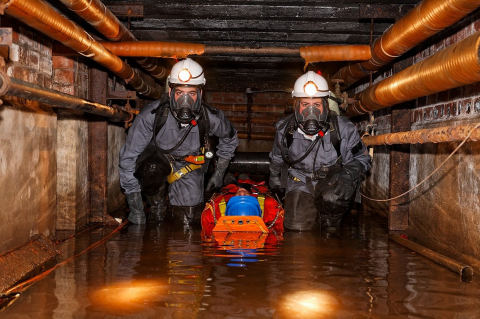Category: Health and Safety

Working at Height
- The definition of working at height
- Precautionary steps to take
Contact Us Call Us
Category: Health and Safety

Slips, Trips and Falls
- Understanding the importance of slips, trips and falls.
- Some pieces of legislation relating to slips, trips and falls.
- Employers and employees’ responsibilities.
- Identifying risks of slips, trips and falls.
- Preventing slips, trips and falls.
Contact Us Call Us
Category: Health and Safety

Sharps Awareness
- What is meant by sharps and sharps injuries
- Handling sharps and needles
- Sharps disposal
- What do if you suffer a sharps injury
Contact Us Call Us
Category: Health and Safety

Noise Awareness
- How you know if there is a noise problem where you work
- Signs and symptoms of a hearing problem
- Who to go to if you have symptoms
- The responsibility of the employer and the employee
- Personal hearing equipment
Contact Us Call Us
Category: Health and Safety

Manual Handling
- What is meant by manual handling and why it is important
- The legal responsibilities
- Causes of injury
- How to identify manual handling hazards
- How to carry out an effective manual handling risk assessment
- The control measures that can be put in place
- How to practice the best manual handling techniques
Contact Us Call Us
Category: Health and Safety

Legionella Awareness
- What is legionnaires disease
- Where can legionnaires disease be contracted
- What measures should be put in place to stop the spread of legionnaires disease
Contact Us Call Us
Category: Health and Safety

Introduction to Risk Assessment
- What is risk assessment?
- What an employer must do
- The 5 steps to risk assessment
Contact Us Call Us
Category: Health and Safety

Introduction to Personal Safety for Lone Workers
- Types of ‘lone working’
- The definitions of ‘lone worker’
- Hazards lone workers can be exposed to
- Controlling the risks
- Responsibility of the lone worker
- Emergency procedure
Contact Us Call Us
Category: Health and Safety

General Health and Safety
- The reasons for managing Health and Safety
- The responsibility of the employer
- The responsibility of the employee
Contact Us Call Us
Category: Health and Safety

Fire Warden Training
- What a Fire Warden is expected to do
- The Regulatory Reform (Fire Safety) Order 2005
- Conducting a fire safety risk assessment
Contact Us Call Us
Category: Health and Safety

Fire Safety
- The fire triangle
- Sources of ignition, fuel and oxygen
- Risk assessments
- Dangerous substances
- Preventing accidental risks and exposure
Contact Us Call Us
Category: Health and Safety

Electrical Safety
- What are the hazards
- Assessing and reducing risk
- Basic measures to control safe use of electrical equipment at work
- Actions to take to improve safety
- Reporting and recording
Contact Us Call Us
Category: Health and Safety

Drug and Alcohol Awareness
- Drugs and the difference between legal and illegal drugs.
- How many units are found in the most commonly consumed alcoholic drinks and the effects they can have on us.
- Legislation surrounding the effects of being under the influence of drugs and alcohol.
Contact Us Call Us
Category: Health and Safety

Display Screen Equipment
- The different types of display screen equipment
- How employers should ensure safe usage of display screen equipment
- How we can ensure we are safely using display screen equipment when we are working at home
Contact Us Call Us
Category: Health and Safety

Control of Substances Hazardous to Health (COSHH)
- What is meant be COSHH
- COSHH assessments
- Hazard pictograms
- Employee responsibility
Contact Us Call Us
Category: Health and Safety

COMAH
- The definition of COMAH
- The competent authority
- Workplaces and industries effected by COMAH
- Duties of Lower and Upper tier COMAH sites
Contact Us Call Us
Category: Health and Safety

Construction Design and Management Regulations 2015
- What is CDM
- CDM duty holders
- What projects are notifiable
- CDM documents
Contact Us Call Us
Category: Health and Safety

CPR Basics
- The steps of CPR
- The recovery position
- Spinal injury
Contact Us Call Us
Category: Health and Safety

First Aid
- Employer and employee responsibilities
- The definition of a First Aider
- What to do in an emergency
- Record keeping
Contact Us Call Us
Category: Health and Safety

Driving Safety
Communication
- Communication with other road users including signals
- Cooperation with other road users
- Separation distances
- Emergency vehicles
Identifying and Responding to Hazards
- Identifying hazards and how to respond to them
Breakdowns and Incidents – what to do in a:
- Breakdown
- Collision
- Incident
Contact Us Call Us
Category: Health and Safety

Confined Space
- The definition of confined space
- The dangers of confined space
- Risk assessments
- What to do if risks are identified
- Emergency procedures
Contact Us Call Us
Category: Health and Safety

Asbestos Safety
- The definition of asbestos and its effects on health
- The types, uses and likely occurrence of asbestos and asbestos materials in buildings
- The general procedures to deal with an emergency, e.g. an uncontrolled release of asbestos dust into the workplace
- How to reduce the risk of exposure to asbestos
Contact Us Call Us
Category: Food Hygiene and Safety

Level 2 Food Hygiene and Safety for Manufacturing
- Your responsibilities and those of your employer
- The principles of food safety management systems
- Different types of food hazards and why it’s important to control contamination
- Safe practices around food storage for different types of food
- The differences between ‘use by’ and ‘best before’ dates
- How premises should be designed to reduce hazards and your responsibilities around cleaning and pest control
Contact Us Call Us
Category: Food Hygiene and Safety

Level 2 Food Hygiene and Safety for Catering
- Your responsibilities and those of your employer • How to prepare food safely
- The principles of food safety management systems
- Different types of food hazards and why it’s important to control contamination
- Safe practices around food storage for different types of food
- The differences between ‘use by’ and ‘best before’ dates
- How premises should be designed to reduce hazards and your responsibilities around cleaning and pest control
Contact Us Call Us
Category: Workplace Skills

Creative Thinking
- What is meant by creative thinking?
- Why is creative thinking important?
- What prevents creative thinking?
- Ways to improve your creative thinking
Contact Us Call Us
Category: Workplace Skills

Making Decisions
- What is meant by decision making?
- Decision making methods
- Steps to take when making a decision
- What can prevent effective decision making?
- Why decision making skills are important
- How to improve decision making skills
Contact Us Call Us
Category: Workplace Skills

Having Empathy
- What is empathy?
- The different types of empathy
- Why is empathy important in the workplace?
- How to improve your level of empathy
Contact Us Call Us
Category: Workplace Skills

Confidence
- What is confidence?
- Why is confidence important in the workplace?
- How to build self confidence
- How to deal with low confidence
Contact Us Call Us
Category: Workplace Skills

Communication
- What is communication?
- What are the types of communication?
- What is effective communication?
- How to Improve communication at work
Contact Us Call Us
Category: Workplace Skills

Working as part of a team
- What is a team?
- What are teamwork skills?
- Benefits of working as a team
Contact Us Call Us
Category: Wellbeing

Times of Uncertainty
- What is meant by uncertainty
- Why uncertainty can cause issues such as anxiety
- What does anxiety look like
- Ways to cope with uncertainty and anxiety
Contact Us Call Us
Category: Wellbeing

Financial Wellbeing
- Low pay and financial well being
- Employee financial well being
Contact Us Call Us
Category: Wellbeing

Wellness at Work
- Practical tools and techniques to support wellbeing and resilience
- Promotion and awareness of wellbeing at work
- Achieving a positive work life balance including in the context of homeworking
Contact Us Call Us
Category: Wellbeing

Spotting the Signs of Stress
- What is stress at work
- Promotion of good mental and physical wellbeing
- Increasing awareness and understanding mental health issues
- Support mechanisms
Contact Us Call Us
Category: Wellbeing

Raising Low Self Esteem
- What is meant by mental health
- Causes of low self esteem
- How to develop positive self esteem
Contact Us Call Us
Category: Wellbeing

Stress at Work
- What is work related stress?
- Stress in the time of Coronavirus
- Monitoring and reducing workplace stress
- Signs of work-related stress
- The effects of workplace stress
- Dealing with stress at work
Contact Us Call Us
Category: Wellbeing

Mental Health Awareness
- What is meant by mental health and wellbeing
- Stress and the impact of long-term stress
- The signs of stress
- Stigma and mental health
- Steps you can take to improve mental health
Contact Us Call Us
Category: Wellbeing

Building Resilience
- How you can develop the personal attributes that will help you tackle lifes challenges
- Practical steps for developing the five pillars of resilience
- Ways to gain a healthier mindset that helps you bounce back from difficulties and find greater happiness in life
Contact Us Call Us
Category: Lean

Supply Chain Management and Digitisation
- What are supply chains?
- What is meant by supply chain management?
- Lean supply chain
- Supply chain information systems
Contact Us Call Us
Category: Lean

Agile Project Management
- What is project management?
- What is meant by Agile?
- The difference between Agile and Waterfall methodology and how to use them
- What is meant by Scrum framework?
Contact Us Call Us
Category: Lean

Fundamental Lean Tools
- 5S
- Kaizen
- Standard Work
- Training Within Industry
Contact Us Call Us
Category: Lean

Problem Solving and Process Improvement
- What is problem solving?
- What are the steps of problem solving?
- Introduction to DMAIC
Contact Us Call Us
Category: Lean

Quality Philosophies and Practical Considerations of Quality
- Philip Crosby and Zero Defects
- Mistake Proofing
- Cost Quality
Contact Us Call Us
Category: Lean

Quality Systems and Tools
- What is Quality?
- What is TQM?
- Six Sigma
- The 7 Quality Tools
Contact Us Call Us
Category: Lean

Lean Performance Improvement
- Lean performance improvement
- Total Productive Maintenance
- A3 problem-solving
- Lean metrics
Contact Us Call Us
Category: Lean

The Framework and Principles of Operational Excellence
- The different types of waste
- Different Lean principles
- How Shingos 10 guiding principles relate to Lean principles
- Different Lean Tools
Contact Us Call
Category: Lean

History and Evolution of Operational Excellence
- Where did Lean come from?
- The history of Lean
- What is a Lean Enterprise?
- What is Operational Excellence?
Contact Us Call Us
Category: Leadership

Project Management
- Monitoring and communicating project process
- Managing project issues
- Managing resources and time scales
Contact Us Call Us
Category: Leadership + Workplace Skills

Time Management
- Your own natural style of time management
- How to prioritise and schedule tasks more effectively using SMART
- How to overcome procrastination and distractions
- How to motvate yourself to improve productivity
Contact Us Call Us
Category: Leadership

Workload Planning
- Tools for effective workload planning
- Different approaches to plan the workload
- The importance of planning ahead
Contact Us Call Us
Category: Leadership + Workplace Skills + Wellbeing

Conflict Management
- The different types of conflict and common causes
- Who is at risk of conflict and the negative impact it has
- How to carry out a conflict risk assessment
- Strategies and methods to prevent conflicts from occurring or escalating
Contact Us Call Us
Category: Leadership

Effective Collaboration
- The benefits of collaboration
- The key factors for effective collaborative working
- The potential roadblocks to collaborative working
Contact Us Call Us
Category: Leadership

Performance Management
- Performance management techniques
- Dealing with underperformance
- Talent management models
- Meeting organisational objectives through talent management
Contact Us Call Us
Category: Leadership

Developing Your Team
- Team development
- Setting team objectives
- Identifying skill gaps
- Conducting appraisals
- Sharing knowledge within the team
Contact Us Call Us
Category: Leadership

Managing Multiple Teams
- Different types of teams
- The challenges of managing multiple teams
- Strategies for managing multiple teams
- Using technology to manage remote/virtual teams
- Monitoring and maintaining performance
Contact Us Call Us
Category: Leadership

Leadership Styles
- Different types of leadership styles
- Strengths and weaknesses of different leadership styles
- Applying leadership styles to workplace situations
Contact Us Call Us
Category: Leadership

Leadership Theory
- What is leadership?
- The difference between leadership and management
- Leadership theories
Contact Us Call Us
Category: People

Sexual Harassment
- What is sexual harassment?
- Who can experience sexual harassment?
- Examples of harassment in the workplace
- How to handle workplace harassment
Contact Us Call Us
Category: People

Discrimination, Bullying and Harassment
- Discrimination and the law
- Types of unfair treatment
- Direct and indirect discrimination
- Improving equality, diversity and inclusion in your workplace
Contact Us Call Us
Category: People

The Human Rights Act
- What is it?
- What does the act mean for you
- The 16 rights
- Additions to the conventionGet in touch for more information
Contact Us Call Us
Category: People + Health and Safety

Human Factors – Behavioural Safety
- Human factors around the the individual, the job and the organisation
- Safety culture
Get in touch for more information
Contact Us Call Us
Category: People

Disciplinary Procedures
- What is disciplinary procedure
- Deciding on the best procedure
- The disciplinary procedure steps
- What to do after the procedure
Get in touch for more information
Contact Us Call Us
Category: People

Safeguarding
- What safeguarding is and why it is important
- Vulnerable children and adults
- DBS checks
- Young people at work
- Training and supervision
- Working hours for young workers
Get in touch for more information
Contact Us Call Us
Category: People

Whistleblowing
- What is a whistleblower?
- Who to tell and what to expect
- What steps to take if you are treated unfairly
Get in touch for more information
Contact Us Call Us
Category: People

Equality, Diversity and Discrimination
- The definitions of equality, diversity and discrimination
- The Equality Act 2010
- Tackling discrimination
Get in touch for more information
Contact Us Call Us
Category: People

Diversity and Inclusion in the Workplace
- What diversity and inclusion means
- How an effective diversity and inclusion strategy can support business
- Steps you can take to build a more inclusive workplace
Get in touch for more information
Contact Us Call Us
Category: People + Wellbeing

Modern Slavery
- What modern slavery is and the different types that exist
- The signs and indicators of the different types of modern slavery
- How to respond appropriately when a victim of modern slavery is identified
Get in touch for more information
Contact Us Call Us
Category: Business Essentials

RIDDOR
- The cost of workplace injuries and ill health
- The legal requirements under RIDDOR
- Employer responsibilities
- How to report a RIDDOR to the Health and Safety Executive
Get in touch for more information
Contact Us Call Us
Category: Business Essentials

GDPR
- What is GDPR?
- Why do we need GDPR?
- What is classified as a personal breach under GDPR?
- What is a GDPR breach?
- What are the penalties for breaching GDPR?
- What are your rights?
Get in touch for more information
Contact Us Call Us
Category: Business Essentials

Cyber Security
- Cyber crime and cyber security
- Your responsibility as an employee
- What is meant by ‘data breach’
- Cyber security best practices
Get in touch for more information
Contact Us Call Us
Category: Business Essentials

The Criminal Finance Act
- The Criminal Finance Act 2017
- What is meant by ’tax avoidance’ and ‘tax evasion’
- Company liability
- The six principles of reasonable prevention procedures
- Warning signs of tax fraud
- Reporting suspected tax evasion
Get in touch for more information
Contact Us Call Us
Category: Business Essentials

Prevent Duty
- What is meant by Prevent Duty and CONTEST?
- The Prevent strategy
- The relationship between extremism and terrorism
- The signs of ‘radicalisation
- What to do if you suspect someone is at risk
Get in touch for more information
Contact Us Call Us
Category: Business Essentials

Anti-Money Laundering
- What is meant by money laundering?
- How to construct an Anti-Money Laundering (AML) policy
- Warning signs to look out for
- How to protect yourself
- How to report suspicious activity
Get in touch for more information
Contact Us Call Us
Category: Business Essentials

Anti-Bribery and Corruption
- What anti-bribery and corruption is
- How they affect you
- How to respond to them
Get in touch for more information
Contact Us Call Us
Category: Business Essentials

Fraud Awareness
- The definition of fraud
- The impact of fraud and scams
- Different types of fraud
- Fraud prevention techniques
- How to report fraud if you are a victim
Get in touch for more information
Contact Us Call Us
Category: Business Essentials

Competition Law
- What is meant by competition law
- Steps to make sure your business is compliant
- What happens if law is broken
- What to do if you suspect competition law has been broken
Get in touch for more information
Contact Us Call Us













































































